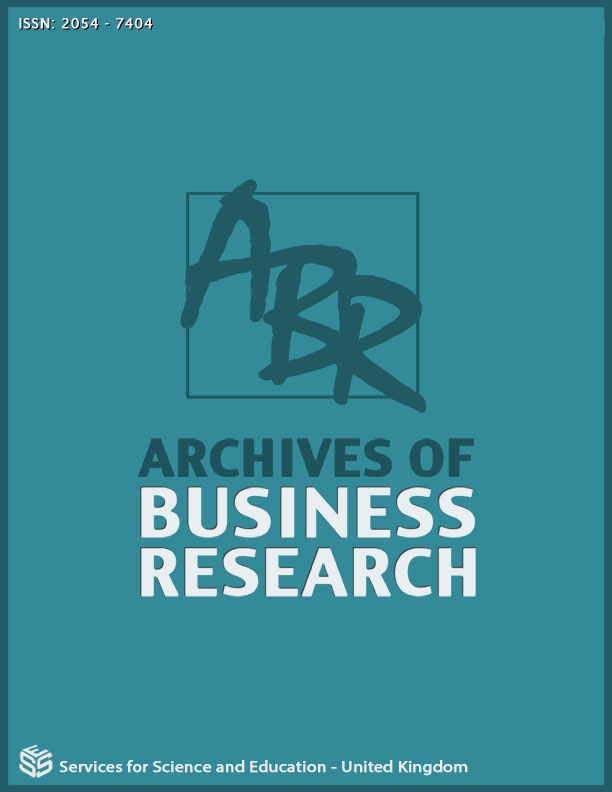Reinventing Performance Management
DOI:
https://doi.org/10.14738/abr.96.10267Keywords:
Performance, management, appraisal, feedback, ratingAbstract
Performance appraisals have traditionally been conducted annually or semi-annually. Recently, many companies are transitioning to ongoing feedback and coaching, either in addition to periodic appraisals, or lieu of them. There have also been calls for completely reinventing performance management systems, as the result of an abundance of research that indicates performance processes are over-engineered and time-consuming, and they tend to demotivate employees while hindering candid and honest conversations. This paper examines the common problems with attribution error and rater bias in traditional performance appraisal systems. Five mini-case studies are then presented by exploring how five large companies (Netflix, Adobe, Deloitte, IBM, GE), have reinvented the way in which performance management is implemented. The paper examines why these companies moved away from traditional performance appraisal and what processes replaced it. The paper also identifies emerging trends that will impact the future of performance management and offers suggestions for the road ahead.
References
] Barends, E., & Briner, R. (2014). Teaching evidence-based practice: lessons from the pioneers: An interview with Amanda Burls and Gordon Guyatt. Academy of Management Learning & Education, 13(3), 476-483.
] Johnson, S., Garrison, L., Hernez-Broome, G., Fleenor, J., & Steed, J. (2012). Go for the goal(s): Relationship between goal setting and transfer of training following leadership development. Academy of Management Learning & Education, 11(4), 555-569.
] Allen, D. G., Bryant, P. C., & Vardaman, J. M. (2010). Retaining talent: Replacing misconceptions with evidence-based strategies. Academy of Management Perspectives, 24(2), 48–64.
. Duffy, M., Scott, K., Shaw, J., Tepper, B., & Aquino, K. (2012). A social context model of envy and social undermining. The Academy of Management Journal, 55(3), 643-666.
] McCord, P. (2014). How Netflix reinvented HR. Harvard Business Review. Retrieved from https://hbr.org/2014/01/how-netflix-reinvented-hr
] Buckingham, M., & Goodall, A. (2015). Reinventing performance management. Harvard Business Review. Retrieved from https://hbr.org/2015/04/reinventing-performance-management
] Dulewicz, V. (1989). Performance appraisal and counseling, in Herriot, P., Assessment and selection in organizations: methods and practices for recruitment and appraisal. New York, NY: John Wiley & Sons. p. 645-649.
] Schleicher, D., Baumann, H., Sullivan, D., Levy, P., Hargrove, D., & Barros-Rivera, B. (2018). Putting the system into performance management systems: A review and agenda for performance management research. Journal of Management, 44(6), 2209-2245.
] Thorndike, E. (1920). A constant error in psychological ratings. Journal of Applied Psychology, 4(1), 25-29.
] Mount, M. K., Judge, T. A., Scullen, S. E., Sytsma, M. R., & Hezlett, S. A. (1998). Trait, rater and level effects in 360-degree performance ratings. Personnel Psychology, 51(3), 557–576.
] Scullen, S., Mount, M., & Goff, M. (2000). Understanding the latent structure of job performance ratings. Journal of Applied Psychology, 85(6), 956-970.
] Hoffman, B., Lance, C., Bynum, B., & Gentry, W. (2010). Rater source effects are alive and well after all. Personnel Psychology, 63(1), 119-151.
] Lloyd, A. (2017). Viewpoint: A new way of looking at performance management. Society for Human Resource Management. Retrieved from https://www.shrm.org/resourcesandtools/hr-topics/employee-relations/pages/viewpoint-a-new-way-of-looking-at-performance-management.aspx
] Ibid.
] Heathfield, S. (2018). Are annual performance reviews enough to ensure employee success? Thebalancecareers. Retrieved from https://www.thebalancecareers.com/performance-management-is-not-an-annual-appraisal-1918847
] Milam, C. Why are companies ditching performance appraisals? Expedite. Retrieved May 8, 2021 from https://expedite-consulting.com/companies-ditching-performance-appraisals/
. Nahata, S. (2019). Can Netflix double its subscriber base by 2024? MarketRealist. Retrieved from https://marketrealist.com/2019/06/can-netflix-double-its-subscriber-base-by-2024/
] McCord, P. (2014). How Netflix reinvented HR. Harvard Business Review. Retrieved from https://hbr.org/2014/01/how-netflix-reinvented-hr
] Ibid.
] Netflix jobs. Netflix. Retrieved February 17, 2021 from https://jobs.netflix.com/culture
] Milam, C. Why are companies ditching performance appraisals? Expedite. Retrieved August 28, 2019 from https://expedite-consulting.com/companies-ditching-performance-appraisals/
] The story of Check-in. Adobe. Retrieved February 17, 2021 from https://www.adobe.com/check-in.html
] Ibid.
] Buckingham, M., & Goodall, A. (2015). Reinventing performance management. Harvard Business Review. Retrieved from https://hbr.org/2015/04/reinventing-performance-management
] Ibid.
] Milam, C. Why are companies ditching performance appraisals? Expedite. Retrieved April 16, 2021 from https://expedite-consulting.com/companies-ditching-performance-appraisals/
] Ibid.
] Zillman, C. (2016). IBM is blowing up its annual performance review. Fortune. Retrieved from https://fortune.com/2016/02/01/ibm-employee-performance-reviews/
] Birt, M. (2017). Why General Electric moved away from traditional HR review practices. Financial Post. Retrieved from https://business.financialpost.com/executive/why-general-electric-moved-away-from-traditional-hr-review-practices
] Capelli, P., & Tavis, A. (2018). HR goes agile. Harvard Business Review. Retrieved from https://hbr.org/2018/03/the-new-rules-of-talent-management
] Goldsmith, M. (2015). Try feedforward instead of feedback. Marshall Goldsmith. Retrieved from https://www.marshallgoldsmith.com/articles/try-feedforward-instead-feedback/
Downloads
Published
How to Cite
Issue
Section
License
Copyright (c) 2021 Derek Crews

This work is licensed under a Creative Commons Attribution 4.0 International License.






